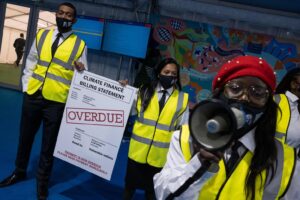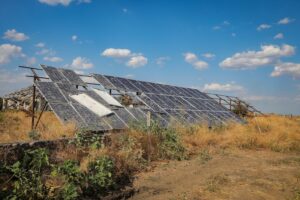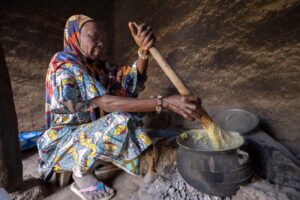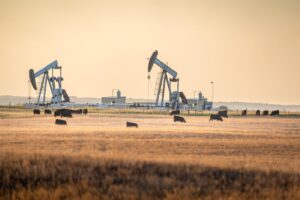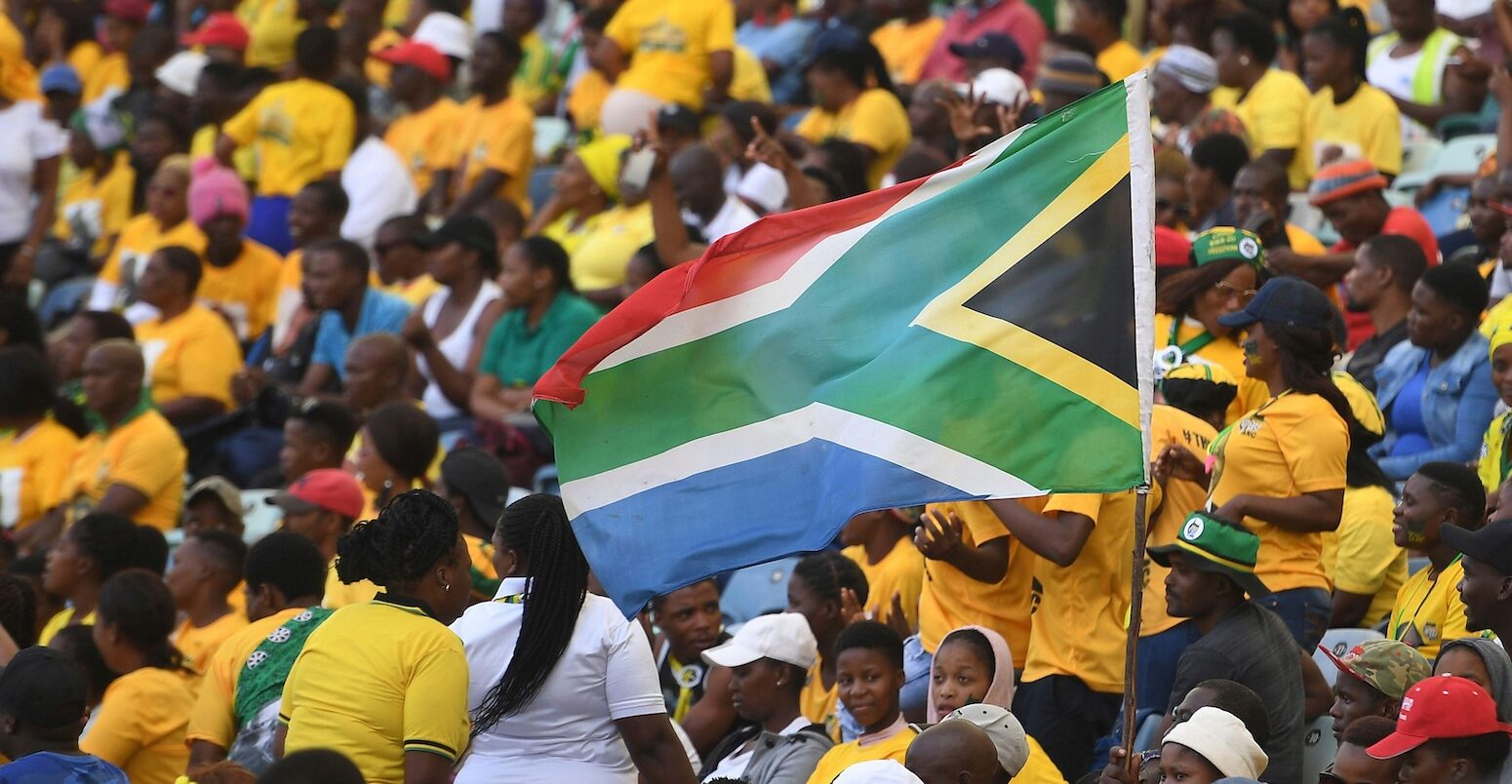
South Africa election 2024: What the manifestos say on energy and climate
Solomon Elusoji
05.22.24Solomon Elusoji
22.05.2024 | 2:46pmNearly 28 million South African registered voters will go to the polls on 29 May to elect more than 800 representatives to the national assembly and provincial legislatures.
The leader of the party that secures a majority in the 400-member national assembly will become the country’s next president.
For the first time, independent candidates will be allowed to run, although all but 11 of the 14,889 certified candidates were nominated by 70 political parties.
The ruling African National Congress (ANC), which has been in office since the end of apartheid in 1994, retains the most support – despite dwindling fortunes.
Its closest challengers are the right-leaning Democratic Alliance (DA) and the left-leaning Economic Freedom Fighters (EFF).
A new party formed by former president Jacob Zuma, uMkhonto we Sizwe (MK), had been expected to also play a significant role in the election. However, South Africa’s top court has now ruled that due to the 15-month jail sentence he served, Zuma himself is ineligible to run.
South Africa – a country with more than 62 million people and considered the most industrialised economy in Africa – was the world’s 14th largest emitter of greenhouse gases in 2018. (See Carbon Brief’s South Africa profile for more.)
The country is gripped by a severe electricity crisis due to faltering and ageing coal power plants, which account for more than 80% of power generation.
Shortages have forced the government to implement electricity rationing, known as load shedding – helping drive a boom in rooftop solar for those that can afford it.
The ongoing crisis – and a failure to meet wider renewables goals – means coal plants will be kept running for longer and the country’s 2030 climate pledge will be missed.
In the interactive grid below, Carbon Brief tracks the commitments made by South Africa’s leading political party, the ANC, and its closest challengers, the DA and EFF, in their latest election manifestos. The grid covers a range of issues connected to climate change.
Each entry in the grid represents a direct quote from one or more of these documents.
Update 3 June 2024: For the first time in 30 years, the African National Congress (ANC) lost its majority in South Africa’s 400-seat parliament after winning 159 seats. The Democratic Alliance (DA) placed second with 87 seats; uMkhonto weSizwe (MK), the party of former president Jacob Zuma, who has disputed the election results, came third with 58 seats; and the far-left Economic Freedom Fighters (EFF) got 9.5%. The ANC will require a coalition to continue its rule over South Africa. See the grid below to get a sense of climate and energy policies featured in the ANC – and two of its potential allies’ – manifesto.
Climate policy
South Africa is already experiencing the impact of climate change, including droughts, floods and an acute water crisis. However, climate change itself is not a key focus for South African voters; as of 2021, only about half of South Africans said they had heard of climate change.
Meanwhile, under the ANC, the South African government has strengthened its commitment to the Paris Agreement, by pledging to cut greenhouse gas emissions to between 350m tonnes of carbon dioxide equivalent (MtCO2e) and 420MtCO2e by 2030, from 442MtCO2e in 2020.
The country has also set the goal of net-zero emissions by 2050, although a presidential commission report suggested it would require up to 535bn rand ($29bn) per year to meet its climate targets. South Africa’s national climate plan also emphasises the importance of adaptation in the face of climate impacts.
In its manifesto for the 2024 election, the ANC reiterates its commitment to net-zero, adaptation and mitigation plans, plus pledges to continue to “work with other countries in the fight against climate change, global poverty and inequality in line with applicable international resolutions”.
The DA manifesto also says it is committed to “achieving net-zero carbon emissions to reduce the impact of energy generation on the climate”.
Within its manifesto, the EFF also pitches climate action, although it does not explicitly back the net-zero target. It says:
“The EFF government will reduce carbon emissions by 10% by 2029 and will renegotiate our nationally determined contribution (NDC), which includes components on climate adaptation and mitigation as well as support requirements for both.”
However, a professor of politics at the Wits School of Governance, David Everatt tells Carbon Brief most South African political parties have merely performed a “ritual nod towards climate change” in their manifestos, as climate concerns are not a major campaign issue in the country.
Instead, the focus is on reducing load-shedding and strengthening energy security.
Electricity policy
The revitalisation of South Africa’s power sector is undoubtedly one of the major focuses of the coming election.
“The vast majority of the debate in South Africa is about the power sector and load-shedding,” says Dr Tracy Ledger, head of the energy transition programme at PARI, an African research institute affiliated to the University of Johannesburg and Wits University in South Africa. She tells Carbon Brief:
“Load shedding has ruined people’s lives and devastated the economy; the economy is probably 20% smaller than it would be without load shedding; hundreds of thousands of jobs have been lost. It’s been a disaster.”
During COP26 in Glasgow, South Africa, alongside France, Germany, the UK, US and the European Union, announced a Just Energy Transition Partnership. This is designed to mobilise an initial $8.5bn to support South Africa “to move away from coal and to accelerate its transition to a low emission, climate resilient economy”.
However, South Africa’s worsening electricity crisis has raised concerns that it may struggle to fulfil its climate ambitions. In April 2023, president Cyril Ramaphosa said the government will consider a delay in the decommissioning of coal plants to help ease electricity cuts.
Another concern is the potential job losses associated with coal decommissioning in Mpumalanga province, an area known as South Africa’s coal belt.
In their 2024 election manifestos, the ANC and the DA do not mention coal, instead pledging investments in renewable energy. However, the EFF says that it would “establish a state-owned mining company to manage coal mines owned by Eskom (South Africa’s state-run power utility), ensuring a quality coal supply at affordable prices”.
Dr Ledger tells Carbon Brief:
“The DA is very much in favour of the just energy transition. The official line of the ANC is that they support the energy transition, but the ANC is in so many factions, and there are a lot of factions within the ANC that are anti-energy transition.
“The EFF is trying to keep everyone happy at the same time. They are saying we need security of supply and we need to address climate change, but we can’t close any coal-fired power stations because people will lose their jobs.”
Meanwhile, despite the continued support for coal in South Africa, particularly in Mpumalanga province, the ANC, DA and EFF all acknowledge the importance of renewable energy in their manifestos.
Dr Ledger believes that regardless of the rhetoric around coal, renewables have a place in South Africa’s energy mix:
“There is now so much embedded [renewable] generation making up the deficit [in supplies from the central grid]. The coal plants will eventually have to shut down. We can’t afford a nuclear power plant and the treasury will never approve it. So, the only practical option available is the private sector and renewables. The energy transition is kind of happening by stealth.
“Electricity generation in South Africa is being privatised and what the private sector is interested in is renewables and maybe a little bit of gas. But gas can’t compete on price with solar. Nothing can compete with solar. Solar in South Africa is already 30% cheaper than the power being produced by Eskom from its coal-fired power stations. And in ten years time, it will be 70% cheaper. That’s what is going to drive the energy transition in South Africa.”
Water policy
Alongside the power crisis, South Africa is also suffering a water crisis, as droughts become increasingly common. In March, thousands lined up for water in the country’s largest city, Johannesburg.
Record temperatures have exacerbated the problem, but the issue has also been politicised with the DA, for example, blaming the ANC for mismanaging the country’s water resources.
Meanwhile, sewage systems are leaking and polluting the country’s freshwater supply, further complicating the matter.
According to Prof Richard Meissner, a water governance expert at the University of South Africa, water-related issues are set to play a more significant role in the 2024 election than in previous years. He tells Carbon Brief:
“It’s important to note that South Africans use 61.8% more water than the global average, which is 173 litres per day. This is largely due to issues such as leaks, wastage and illegal connections, which can be addressed through proper infrastructure maintenance.”
He adds that political parties have also focused on water security in their manifestos, proposing specific solutions to improve water and sanitation services.
For example, the ANC promises it will allocate more powers to the national and provincial government to provide clean water to citizens. The EFF has a similar solution – prioritising government intervention.
The DA, on the other hand, wants to involve “private companies in water infrastructure projects through a performance-based private-public partnership model”.
-
South Africa election 2024: What the manifestos say on energy and climate


